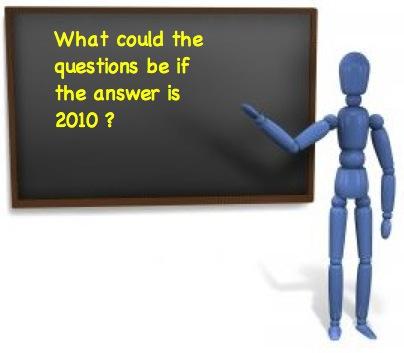It Was 2010!
Problem
At the start of a new year teachers often like to use the number of that year.
Well I know that some teachers often use an idea like,

The pupils would get things like:
$16 \div 2$
$20 - 4 - 4 - 4$
$6 + 2$
$\sqrt{64}$
So here's a challenge to make an answer of $2010$

You could try things like:
$$2000 + 10 \quad\quad 201 \times 10\quad\quad 500 + 1000 + 500 + 5 + 5$$
Don't forget you might like to use calculators or computers!
See what different questions you can find and compare yours with others.
Perhaps you can make up one that is easy, one that is harder and one that is very hard.
Now that $2010$ has passed try the same for the year we have now!
Getting Started
Could you use more/fewer numbers?
Have you thought about decimals/fractions/square numbers/negative numbers ...?
Student Solutions
Well we certainly had a lot of solutions sent in THANK YOU! Here are just a selection.
On the $1$st of January we had this idea from Nebal from Al khor school in Qatar:
$4$ times $5$ then times $100$ then add to the product of $2$ times $5$
which could be written as $(4\times5\times100)+(2\times5)$
Priyanha from North Haringay said - quite amusingly - that the question was
"What is the year?"
Priya from Edgbaston High School gave an example using four different actions,
$2000 + 20 - 10$ squared add $10$ minus $5$ and $4 - 9$ square rooted!
which of course would have been difficult to write just using symbols.
Anabel from the Convent of Jesus and Mary wrote
The squared root of four million forty thousand and one hundred.
Kiran from Brooke Weston Academy produced ideas as follows:
$2\times3\times5\times67$ (Prime Factor Decomposition)
$11111011010$ in binary
MM+X in Roman addition to give MMX
A good combination of different operations came from Hannah at Rawdon Littlemoor School:
$4$ squared $\times 100 + 25 $ squared $ - 215$
James from Queen Victoria School (who sent in many solutions) sent in:
$8\times6=48 +2=50\times25=1250+50=1300+710=2010$
We have to be a little bit careful of where we put an equals sign when we're writing out a calculation like that one, but we understand what you mean, James.
Qize Jaic from Brook Street sent in
$201000000000000000 \div 100000000000000$
These from Tudhoe Grange Lower School (Lucy, Brianna, Jordan and Hannah Louise):
"What year will be the reggae singer Bob Marley's $65$th birthday?"
"What is this word ... net-dna-dnasuoht-owt?"
Two thousand and ten 1s , added together.
$211-25-22-2 =2010$
These from Aycliffe Drive School, (Omotayu, Callum and Jonathan):
Using just $1$'s and zeros:
$1000$ divided by $1$add $10$ add $1000$
Good use of brackets:
$((((610\times2)-200)-20)+5)\times2$
James from Eskdale sent in his good idea:
$6950428-6940423+1005$
Samuel from Scisset School also had a good idea:
$30$ squared $ + 35$ squared $ - 11$
Krystof sent in these two which were both well thought-out:
$16^3 - 2000 - 96 + 10$
$12^3 +5^3+5^3+4^3-5^2-2^3+1$
Well done all of you I am very pleased that so much good work came from you all who sent ideas in.
